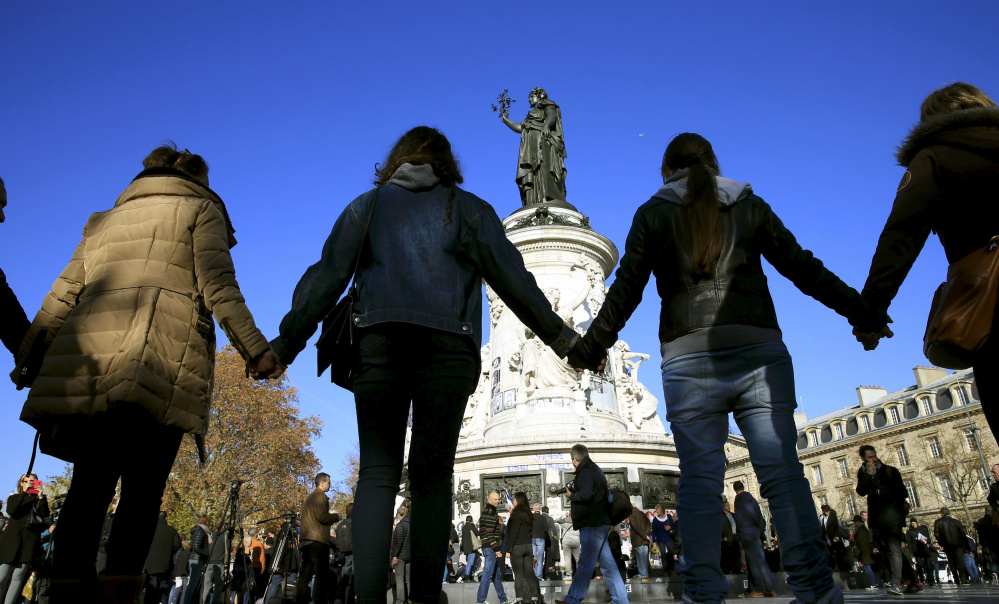PARIS — There was a moment – just a moment – when the concert hall was eerily quiet. The rock band had stopped playing, and people had dived to the floor after realizing the sudden explosions hadn’t been part of the show. Everything was silent.
Then the attackers started again, strafing the crowd with automatic gunfire. There were screams of terror, the staccato of Kalashnikovs and cries of the wounded, followed by a standoff with police and the explosions of suicide bombs.
By the time the ordeal was over at one of Paris’ celebrated entertainment venues, 89 people were dead and many more were wounded, entangled bodies in pools of blood.
A French survivor summed it up with one word: “Hell.”
It was a sell-out crowd at the Bataclan on Friday for the 9 p.m. concert by an American group, the Eagles of Death Metal.
Less than an hour after the band began its set, a series of bangs rang out. Many thought it was firecrackers or pyrotechnics.
“Everyone thought it was part of the show, but then I saw the lead singer’s face drop before he ran off stage, and the lights came on,” university student Hanna Corbett, 21, told the Nottingham Post newspaper of Britain.
“We all just dropped to the floor. When the music stopped, there was this haunting silence in between gunfire and I could see blood on the floor.”
The Bataclan already had a storied history, opening its doors on Paris’ Right Bank in 1865. French crooner Maurice Chevalier of “Gigi” fame enjoyed some of his earliest successes there, before it was converted into a movie theater, devastated by fire and resurrected as a concert hall again in the mid-1980s.
Friday’s headliner was a California band whose music is far less harsh than its name, described by a co-founder as a mix of bluegrass slide guitar, stripper drum beats and Canned Heat-style vocals.
As the Eagles of Death Metal performed about 9:40 p.m., a black Volkswagen Polo pulled up and parked outside the Bataclan, French officials said.
Three occupants emerged from the vehicle, armed with automatic weapons and wearing belts packed with extremely volatile explosives. They entered the club apparently unnoticed amid the high-decibel music, and opened fire on the crowd.
‘ASSAILANTS COMING TOWARD US’
Julien Pearce, a journalist at Europe 1 radio, also thought the pop-pop noises were a harmless part of the act.
“Then I looked back and saw the assailants … who were coming toward us with assault rifles and were randomly firing into the crowd,” he said on Europe 1. “We immediately got on the ground to protect ourselves, to be less exposed.”
The Bataclan had become one of the targets of the deadliest violence to hit the French capital since World War II.
That same evening outside the France-Germany soccer match in Paris’ northern suburbs, a pair of suicide bombers had already detonated their explosives, and another would blow himself up on Boulevard Voltaire, a thoroughfare in eastern Paris near the Bataclan.
The coordinated attack included volleys of Kalashnikov fire at Parisians and others who thronged bars and restaurants on an unseasonably balmy November night.
In all, at least 129 people were killed and 350 injured. France’s leaders have said their country is now at war.
In claiming responsibility for the attacks, the Islamic State said the Bataclan had expressly been targeted for its “hundreds of pagans gathered for a concert of prostitution and vice.”
‘JUST GET OUT OF HERE’
The gunmen in the concert hall “were very calm, very methodical, very slow,” John Leader, 46, told Australia Broadcasting Corp. after escaping with his 12-year-old son. Two of the men worked together, one aiming and shooting while the other covered him.
“They weren’t in there shooting like in an American movie,” Leader said. “It was finding a target and then shooting, and then finding the next target and then shooting.”
After several minutes of lying still on the Bataclan’s floor, Pearce and people around him decided to move as the gunmen paused to reload.
“We needed to get out of this hell, to try something, at least,” he said.
“Bullets started to fly again in our direction so we ran, crawled and got into a tiny dark room next to the stage.”
“There was no exit, so we were just in another trap, less exposed, but still a trap,” he said.
Other people escaped through the Bataclan’s side doors, some dragging bodies with them. One woman clung to a second-story window, trying to get out of the line of fire.
Among those trying to flee was the sister of French soccer striker Antoine Griezmann, who was playing in the game going on against Germany.
Mariesha Payne and Christine Tudhope, both from Scotland, hid in a cellar at the Bataclan for three hours.
They had come to Paris to celebrate Tudhope’s 35th birthday and were standing near the stage when the shooting started.
Speaking to Sky News after they returned to Edinburgh airport, Payne, 33, said she saw bullets hit the stage. “A second round went off, most people ducked, but I just said, ‘Run, just get out of here,”‘ she said.
Pearce, the radio journalist, finally reached the emergency exit, where he helped a wounded young woman run to safety.
Send questions/comments to the editors.



Success. Please wait for the page to reload. If the page does not reload within 5 seconds, please refresh the page.
Enter your email and password to access comments.
Hi, to comment on stories you must . This profile is in addition to your subscription and website login.
Already have a commenting profile? .
Invalid username/password.
Please check your email to confirm and complete your registration.
Only subscribers are eligible to post comments. Please subscribe or login first for digital access. Here’s why.
Use the form below to reset your password. When you've submitted your account email, we will send an email with a reset code.